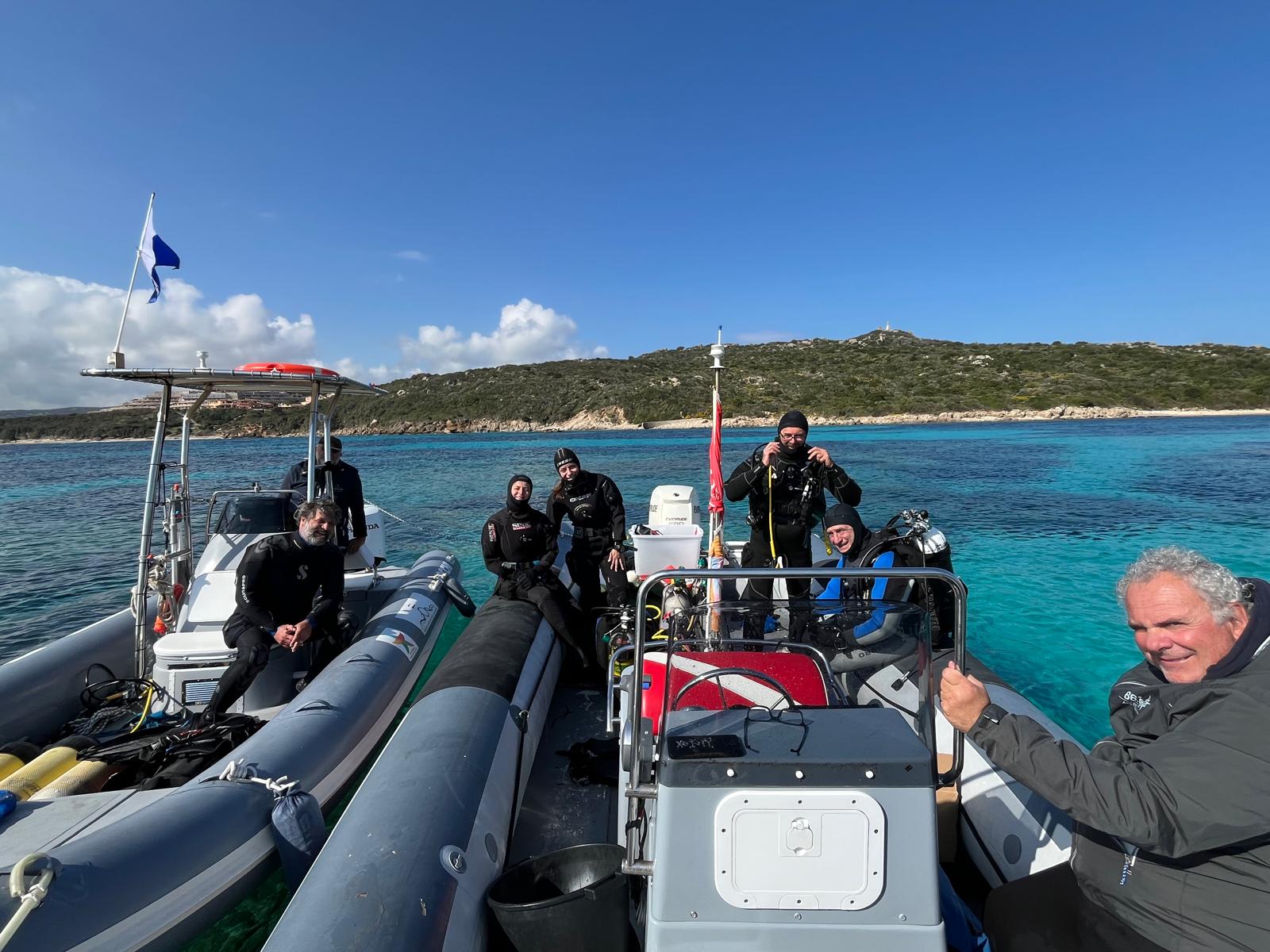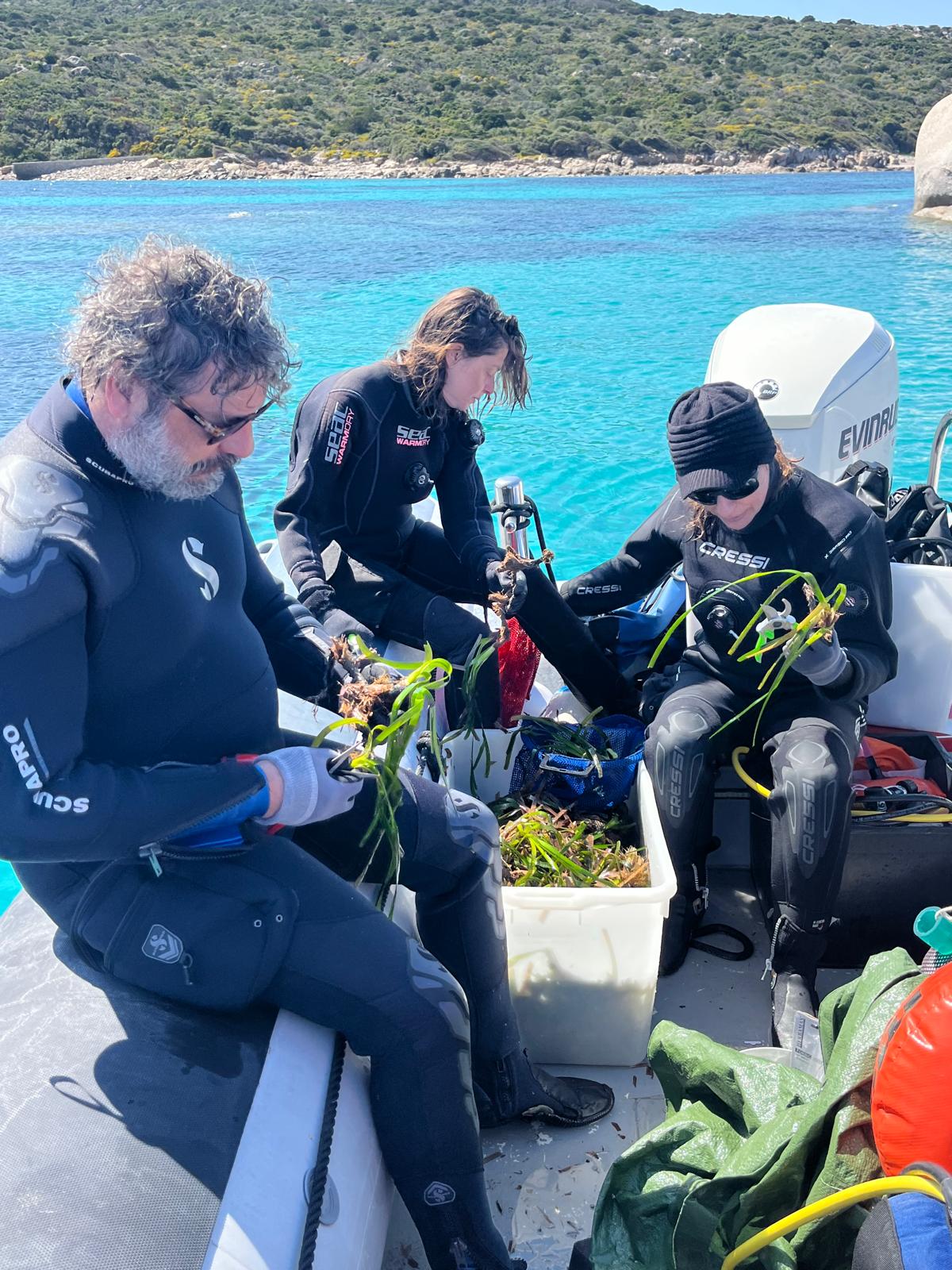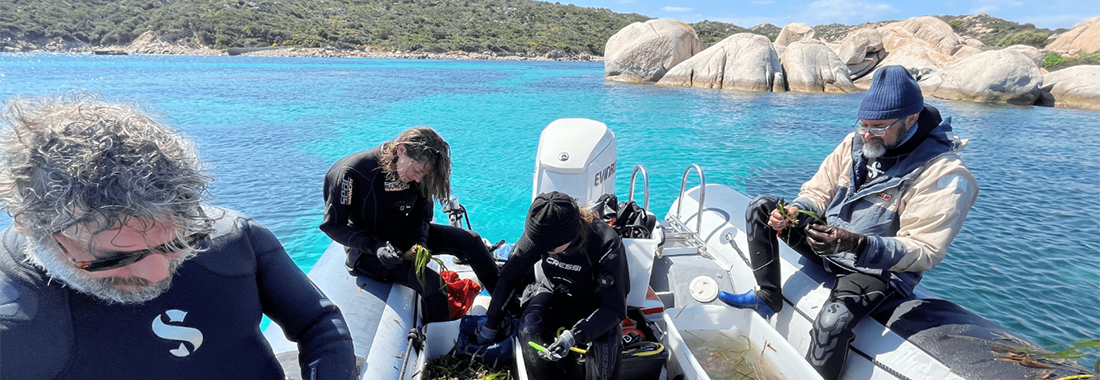Marine reforestation efforts under the European Interreg Euro-MED “ARTEMIS” project have officially begun off the northern coast of Sardinia, in Santa Teresa Gallura. The intervention is taking place within the Capo Testa – Punta Falcone Marine Protected Area (MPA), one of the project’s four pilot sites and an associated partner. It is coordinated by the technical team of the MEDSEA Foundation, led by marine biologist Francesca Frau, in close collaboration with the MPA’s staff under the direction of Yuri Donno.
Scientific divers have started collecting cuttings of Posidonia oceanica, which are being planted in previously mapped and monitored degraded seagrass areas deemed suitable for restoration. The affected seafloor areas have been heavily impacted by human activities, particularly recreational boating.
This initiative is part of the broader effort of the ARTEMIS project – Restoring and Valuing the Blue Forest of the Mediterranean Sea (see official website), funded by the Interreg Euro-MED programme. ARTEMIS aims to restore the integrity of marine ecosystems, focusing on Posidonia oceanica, an endemic Mediterranean seagrass. These underwater meadows are among the most valuable ecosystems in the Mediterranean: they act as powerful blue carbon sinks (absorbing excess CO₂ responsible for climate change), produce significant amounts of oxygen, support marine biodiversity, and protect coastlines from erosion.

The MEDSEA team plans to plant over 2,000 Posidonia cuttings, restoring approximately 200 square meters of seagrass meadow. The planting is done using small anchors to secure the cuttings to the seabed, allowing them to take root over time. Monitoring activities scheduled for the coming months will assess the success of the intervention. Prior to the fieldwork, biodiversity and blue carbon levels were measured in both degraded and healthy seagrass areas, to estimate their economic and financial value.
The initiative in Santa Teresa Gallura is part of a broader strategic action to demonstrate the ecological and economic value of marine ecosystems, and to promote both public policies and private investment in nature conservation.
Francesca Frau, MEDSEA’s lead for the ARTEMIS project and an expert in Posidonia oceanica reforestation, stated:
"Posidonia oceanica meadows are the beating heart of the Mediterranean—an essential ecosystem we are working to protect and restore through ARTEMIS.
Each cutting we plant is not just an act of ecological restoration but a concrete investment in the future of our sea. These meadows are biodiversity treasure troves and powerful allies in the fight against climate change, thanks to their extraordinary carbon storage capacity. The work we are doing within the Capo Testa MPA, in the municipality of Santa Teresa Gallura, shows how collaboration between institutions, scientific research, and local communities can translate into effective actions for marine conservation."
Yuri Donno, director of the Capo Testa – Punta Falcone Marine Protected Area, and associated partner in ARTEMIS, added:
“The Capo Testa – Punta Falcone MPA is proud to host this important reforestation project. Our collaboration with MEDSEA and ARTEMIS allows us to directly intervene in areas degraded by human pressure, restoring vitality to one of the Mediterranean’s most precious ecosystems. However, restoration alone is not enough—we must also focus on prevention. That’s why, with funding from the Italian PNRR MER programme, we’ve planned the installation of 150 mooring buoys across the entire MPA, from Licciola to Santa Maria Reparata, to provide sustainable anchoring points for boats and protect the seabed."

What is ARTEMIS?
ARTEMIS, funded by the Interreg Euro-MED programme, is dedicated to the restoration of Mediterranean seagrass meadows. It focuses on four pilot sites: Sardinia (IT), Menorca (ES), Crete (GR), and Monfalcone (IT). By assessing the ecological and socio-economic value of these vital ecosystems, ARTEMIS aims to embed their benefits into public and private policies, promoting sustainable investments in nature-based solutions.
Through the strategic collaboration of ten partners, the project fosters policy harmonization and the adoption of innovative governance models to strengthen biodiversity, climate resilience, and sustainable economic development across the Euro-Mediterranean region.
ARTEMIS is coordinated by the French organization Plan Bleu (PB) and includes the following partners: Hellenic Centre for Marine Research (HCMR), Italian Institute for Environmental Protection and Research (ISPRA), Mediterranean Sea and Coast Foundation (MEDSEA), Minorcan Institute of Studies – Socio-Environmental Observatory of Menorca (IME-OBSAM), Municipality of Monfalcone, ECOACSA, EY Denkstatt, Bax & Company, and The Green Tank.
Latest news

ARTEMIS: Marine Reforestation Activities Begin in Northern Sardinia
Marine reforestation efforts under the European Interreg Euro-MED “ARTEMIS” project have officially begun off the northern coast of Sardinia, in Santa Teresa Gallura.

REST-COAST: Strategies for the Protection of European Coasts Outlined in Catania
From March 24 to 27, 2025, the annual meeting of the European project REST-COAST, funded by the Horizon 2020 program, was held in Catania. The meeting marked a key milestone toward the…

A Forest for Bees Takes Root in Sardinia: Restoring Nature, Supporting Pollinators
The planting operations for the first Forest for Bees installation—a forest for bees—have been completed in Sennariolo (OR). This is a special one-hectare forest dedicated to bees and pollinators, essential insects for food…

Altare Hosts RICREA Meeting: Shared Strategies Through Ecological Transition Contracts
The third Steering Committee of the RICREA project – Collaborative Network for the Capitalization of REtrAlags – was held in Altare (Savona). The project is funded by the Italy–France Maritime Interreg Programme.

GRRinPORT2: Innovation and Cross-Border Cooperation for Environmental Protection of Ports
On March 20–21, 2025, the Kickoff Meeting of the GRRinPORT2 project – Management of water, waste, and sediments to reduce pollution in ports – was held at the DESTEC Department of the University of Pisa…

MEDSEA Launches the Wetland4Change Project in Terralba to test and validate climate change's solutions
On Friday, March 14, 2025, in the council chamber of Terralba, MEDSEA held a meeting with the Municipality of Terralba to officially introduce Wetland4Change to stakeholders (productive activities, as well as institutional…

In Crete with ARTEMIS to protect seagrass meadows: 2nd Consortium Meeting
From March 4th to 6th, 2025, Heraklion (Crete) hosted the mid-term meeting of the ARTEMIS Interreg Euro-MED Natural Heritage project, organized by the Hellenic Marine Research Centre. This was a crucial moment to…

MEDSEA Heads to Tallinn for the Blue4All Consortium Meeting
Last January, the Blue4All project team gathered in Tallinn for the Consortium Meeting, marking the project's halfway point. The event, hosted by the local partner Keskkonnaamet/Estonian Environmental Board and the University of Tartu, brought together all 22 project partners from across…

ImPelaghiamoci: A Year of Initiatives to Learn About and Protect Cetaceans with the Municipality of Sassari
Promoting greater knowledge of the resident cetaceans in the Pelagos Sanctuary*, a transboundary marine protected area encompassing France, Liguria, Tuscany, and Sardinia, to improve the protection and conservation of these species…

Reforestation Operations Resume in Montiferru: A Forest for Bees by MEDSEA
Reforestation efforts in Montiferru, led by MEDSEA, are back on track. Following the planting of the first 5 hectares of olive trees, holm oaks, and Mediterranean shrubs, the focus now shifts to melliferous plants to…

25 Events in Sardinia for World Wetlands Day
Wetlands such as ponds, lagoons, lakes, rivers, and peatlands form an endless world of aquatic ecosystems. In Sardinia, the call to explore these habitats is open this February with the Sardinian edition of World Wetlands Day.

COASTRUST: Launching Sustainable Coastal Management in Domus de Maria Sardinia
The activities of the COASTRUST project, funded by the European Interreg Euro-MED program, have officially begun in Sardinia. The initiative aims to promote shared environmental management in the Mediterranean's coastal areas, addressing anthropogenic pressures…

Join the World Wetlands Day Sardinia 2025 Calendar: register your Event by January, 22nd
World Wetlands Day is celebrated every year on February 2, marking the adoption of the Convention on Wetlands signed on February 2, 1971, in Ramsar, on the shores of the…

MEDSEA joins the Camargue Red Alert with the Mediterranean Alliance for Wetlands to save birdlife
The MEDSEA Foundation has officially joined 73 other international organizations in signing the Camargue Red Alert, a collective call to action to safeguard the Camargue wetlands in France.

Wetland4Change: MEDSEA in Valencia to Explore Natural Climate Solutions Through Wetlands
The MEDSEA team participated in the second Consortium meeting of the Wetland4Change project in Valencia from November 26 to 28, 2024. The meeting was organized by local project partners, the…

Malta’s First Posidonia Meadow Restoration Project Led by MEDSEA Foundation
Different islands, but similar issues for marine ecosystems, which are heavily threatened by unregulated anchoring from recreational boating and illegal trawling. In Malta, as in Sardinia, the damage is particularly…
- 1
- 2
- 3
- 4

